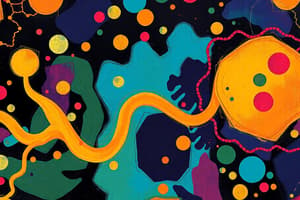Podcast
Questions and Answers
What is the term used to describe an abnormal drug response due to a genetic defect?
What is the term used to describe an abnormal drug response due to a genetic defect?
- Pharmacogenetics
- Pharmacodynamics
- Idiosyncrasy (correct)
- Pharmacokinetics
What is the primary route of drug excretion?
What is the primary route of drug excretion?
- Skin
- Kidney (correct)
- Lungs
- Liver
What is the process by which the free form of a drug is filtered from the blood into the urine?
What is the process by which the free form of a drug is filtered from the blood into the urine?
- Tubular secretion
- Tubular reabsorption
- Glomerular filtration (correct)
- Active transport
Which of the following drugs is actively transported into the lumen of the proximal convoluted tubules?
Which of the following drugs is actively transported into the lumen of the proximal convoluted tubules?
What is the effect of alkalinization of urine on the excretion of acidic drugs?
What is the effect of alkalinization of urine on the excretion of acidic drugs?
Which of the following is an example of a drug that undergoes tubular reabsorption?
Which of the following is an example of a drug that undergoes tubular reabsorption?
What is the effect of probenecid on the excretion of penicillin?
What is the effect of probenecid on the excretion of penicillin?
What is the term used to describe the process of excretion of drugs and their metabolites?
What is the term used to describe the process of excretion of drugs and their metabolites?
Which of the following is an active transport system for the excretion of drugs?
Which of the following is an active transport system for the excretion of drugs?
What is the effect of increasing the pH of urine on the excretion of basic drugs?
What is the effect of increasing the pH of urine on the excretion of basic drugs?
Flashcards are hidden until you start studying
Study Notes
Phase I Metabolism
- Results in inactivation, activation, maintaining activation, or toxification of drugs
- Examples of inactivation: Adrenaline and Noradrenaline → Vanil Mandilic Acid (VMA)
- Examples of activation: Imipramine (Inactive) → Desipramine (Active)
- Examples of maintaining activation: Phenacetin (Active) → Paracetamol (Active)
- Examples of toxification: Methyl alcohol → Formaldehyde → Blindness
Phase II Reactions
- Also known as "Synthetic" or "Conjugation" reactions
- Involve the conjugation of the drug or a metabolite with an endogenous polar compound
- Examples of polar compounds: glucuronic acid, sulphate, glycine, acetate, glutathione, or methyl group
- Mostly result in drug inactivation, with some exceptions
- Examples of exceptions: morphine (active) → morphine 6-glucuronide (active metabolite), minoxidil (inactive) → minoxidil sulphate (active)
Volume of Distribution (Vd)
- The volume of fluid in the body that contains the drug at the same concentration as the blood
- Drugs with high Vd occupy multiple compartments or are concentrated in tissues
- Drugs with low Vd are retained in the vascular compartment due to high molecular weight or high binding to plasma proteins
- Formula to determine the loading dose: A (mg) = Vd X c (mg/ml)
Dialysis
- Can be done only with small Vd, which means most of the drug is present in the circulation
- Example: Aspirin
Metabolism (Biotransformation)
- Chemical reactions that occur mainly in the liver
- Aim to convert lipophilic (lipid soluble) drugs into water-soluble (hydrophilic, ionized, or polar) metabolites
- Sites of biotransformation reactions: liver, plasma, lung, kidney, skin, and GIT
Excretion
- Routes of drug excretion: kidney (renal excretion), and other routes
- Renal excretion: glomerular filtration, tubular reabsorption, and tubular secretion
- Glomerular filtration: a passive process depending on the glomerular filtration rate
- Tubular reabsorption: a passive process, where the unionized (lipophilic) form of the drug undergoes reabsorption
- Tubular secretion: an active process, where some drugs are actively transported into the lumen of the proximal convoluted tubules (PCT) of nephrons
- Examples of drugs that undergo tubular secretion: penicillin, thiazides, loop diuretics, and probenecid
- pH of urine affects the rate of urinary excretion of drugs; Alkalinization of urine increases urinary excretion of acidic drugs as aspirin
Studying That Suits You
Use AI to generate personalized quizzes and flashcards to suit your learning preferences.



